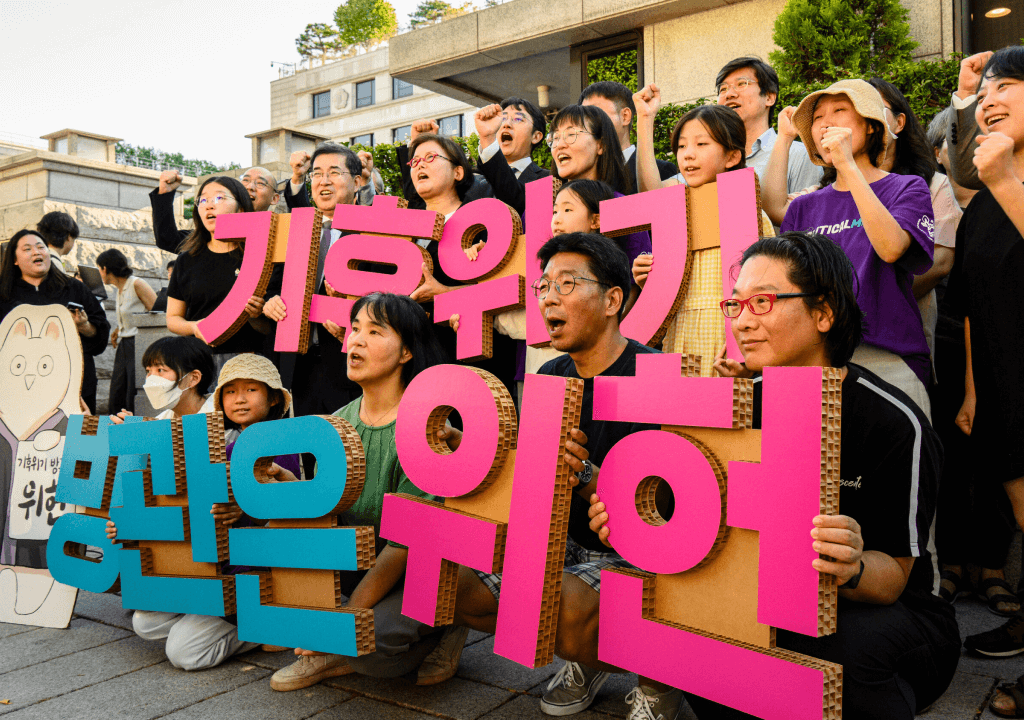Climate laws aimed at curbing global warming, ensuring carbon neutrality, and accelerating the transition to green energy are facing significant backlash from various groups. There are calls from right-wing politicians, activists, and conspiracy theorists on social media to scrap these laws, arguing that they negatively impact businesses and burden taxpayers. Meanwhile, another group is pushing for even stricter climate regulations, despite potential consequences for businesses and daily life. These opposing views have led to clashes online, spilled into the streets, influenced political debates, and are now being contested in the courts.
South Korea’s Constitutional Court has sided with those advocating for stronger climate measures, ruling that parts of the nation’s climate law do not adequately protect the constitutional rights of future generations. This decision, described by local activists as groundbreaking, reflects a similar verdict in Germany and concludes four years of legal disputes, establishing an important precedent for climate litigation in the region. The court found that the lack of legally binding greenhouse gas reduction targets for 2031 to 2049 violates the constitutional rights of future generations and fails to fulfill the government’s obligation to protect these rights. The court stressed that the absence of long-term targets places an unfair burden on future generations and has ordered the National Assembly and government to revise the law to include these targets by February 28, 2026. As a result, the government is now under pressure to act.
South Korea’s Carbon Neutral Act, established in 2010, initially aimed to cut carbon emissions by at least 35 percent by 2030 from 2018 levels. The government has since raised this target to a 40 percent reduction. However, critics contend that this revised goal remains inadequate for effectively addressing climate change. Since 2020, the Constitutional Court has been evaluating complaints from over 250 individuals; one-third of whom were children or teenagers at the time of filing – who claim that the government’s greenhouse gas reduction targets and strategies are partially unconstitutional and inadequate to safeguard the rights of citizens, especially future generations.
South Korea’s climate litigation began in March 2020 when Youth 4 Climate Action, the Korean branch of the global school climate strike movement, filed the first lawsuit. Activists, including Kim Seo-gyeong from Youth 4 Climate Action, see the court’s decision as the beginning of a renewed push for more ambitious climate action. Kim emphasized that addressing the climate crisis requires reducing its risks, managing factors that could worsen the situation, and establishing safety nets to support life and society.
However, the court rejected the plaintiffs’ claim that the government’s 2030 target to reduce greenhouse gas emissions by 40% from 2018 levels, as set out in the country’s carbon neutrality act, violated constitutional rights. The court considered this near-term goal sufficient but found that the law’s lack of specific emission reduction targets for the years between 2031 and 2050 – when the country aims to achieve carbon neutrality – violated the constitutional rights of future generations.
On Thursday, South Korea’s Ministry of Environment announced that it respects the court’s ruling and will take appropriate follow-up actions. Sejong Youn, a solicitor representing all four litigation cases, emphasized that the core issue of unconstitutionality stemmed from reduction targets that imposed an excessive burden without adequately considering the rights of future generations. He stressed that a revised greenhouse gas reduction plan addressing these concerns must be presented within the timeframe set by the court.
This landmark ruling is poised to reverberate far beyond South Korea’s borders, potentially shaping climate litigation and policy across Asia, with countries like Japan and Taiwan already grappling with similar legal battles. One might observe that, for now at least, climate activists appear to be gaining the upper hand in the courtroom, outmaneuvering their climate change-denying counterparts.








